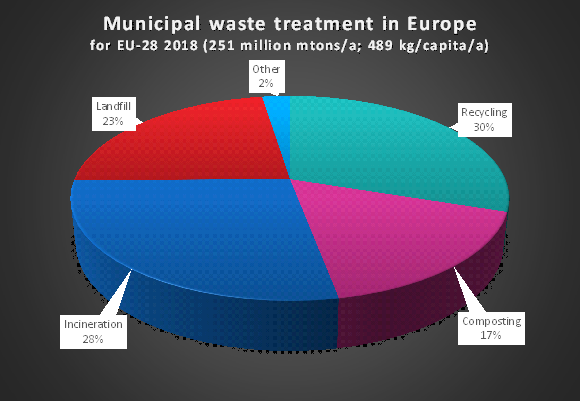Waste in Italy: a burning issue
The coronacrisis is abound with consequences, many of them negative. The Corriere della Sera points to the increase of municipal waste in Italy due to COVID-19. Every day, 37.5 million face masks and 80 million protective gloves are thrown away. With an average weight of 11 gram, 1240 metric tonnes are added to Italy’s garbage pile. For 2020, the additional contribution is estimated at 300,000 metric tonnes. It is likely that the true figure will still be higher, as indirect COVID-rubbish (e.g. single-use packaging as now employed by bars, restaurants, hairdressers, etc.) is not taken into account.
Here we see the psychology of large numbers at work. While 1240 metric tonnes is the equivalent of 70 to 80 trucks fully loaded with pandemic waste on a daily basis and while 300,000 metric tonnes sounds simply frightening, a view at these numbers from a wider perspective gives a different picture. 300,000 metric tonnes per year corresponds with 5 kg per inhabitant, and is a mere 1% of all municipal waste Italians produce. No big deal really, and a quantity which can be easily absorbed, one would think. Within Europe, Italy is an average garbage generator (499 kg/capita/year in 2018 versus 489 for the EU as a whole). The share of greener treatment options (recycling and composting) at 58% even compares favorably with the European average. So what is the problem then?
Today, Italy’s waste management is highly strained. The national waste bin is overflowing. Every additional kg is one too many. Recycling options have become economically less attractive, due to a dramatic drop of raw material costs. Incineration capacity, as the figures below show, is much lower than the European average and is insufficient. Illegal options for waste treatment beckon. Criminal organizations seem to tighten their grip on a profitable industry. The ‘ndrangheta is a front runner.
Time for Italy to invest in new incineration plants, respecting the highest environmental standards. Until then, more waste processing abroad plus your occasional cotton mask might come in handy.


Sources
Eurostat, Municipal waste statistics, June 2019
rvdk



